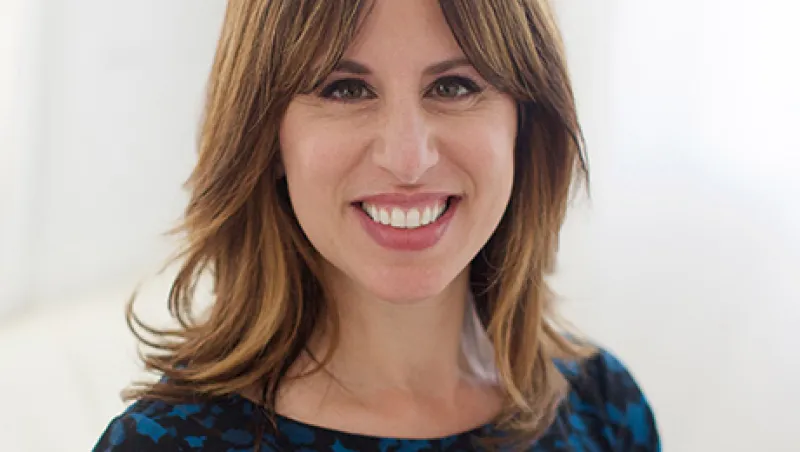Fifteen years ago Tina Powell was running her own digital media and marketing consulting firm when a message left on her answering machine changed her life: Her father had suffered a severe stroke. Twice divorced and penniless, he would rely largely on his children for support before passing away five years later. Witnessing her dad’s financial woes piqued Powell’s interest in money management. She consulted for a wealth manager, later joined the firm and then decided to create an online investing platform aimed specifically at women. In late August she launched her robo-adviser, SheCapital, which she celebrated the next day by ringing the opening bell at the New York Stock Exchange.
Despite the increasing wealth accumulating in female hands, women remain underserved in the male-dominated registered investment advisory industry. Powell, 48, wants to close the gender gap in investment advice, and her approach offers key lessons for firms wishing to target this market: Hire women, change your messaging and harness technology to simplify the process for investors.
In Powell’s view, automated investing is the future: “I think I’m skating to where the puck is going.” Based in Newtown, Pennsylvania, SheCapital is powered by robo-adviser technology from Los Altos, California–based Jemstep with cloud-based portfolio accounting from Orion Advisor Services of Omaha, Nebraska. The platform requires a minimum investment of $5,000 and uses a questionnaire to assess clients’ risk preferences and make recommendations from a range of five investment portfolios. Each portfolio is diversified across ten asset classes and composed of iShares and Vanguard exchange-traded funds.
The service arrives at a time when female RIAs are in hot demand. Women will inherit 70 percent of the $41 trillion in intergenerational wealth transfer expected in the U.S. over the next 40 years, according to Boston College’s Center on Wealth and Philanthropy. But a recent survey by San Francisco–based discount brokerage Charles Schwab Corp. found that nearly half of RIAs have no female advisers and that women represent only 30 percent of advisers in the industry.
As the profit opportunity grows, so will competition. Sallie Krawcheck, owner and chair of New York–based women’s networking group Ellevate and former president of global wealth and investment management at Bank of America Corp., announced in late September that she too is starting a robo-adviser for women, called Ellevest. Once ranked as a top equity analyst on Institutional Investor’s All-America Research Team, Wall Street insider Krawcheck secured $10 million in a Series A financing round led by research firm Morningstar. She has yet to unveil any details about the platform or its offerings, but the plan is for Ellevest to be operational next year.
What makes SheCapital unique among robo-advisers is its educational offerings tailored for women. The firm’s website hosts a blog, currently written by Powell, that explains financial topics for beginners from a female perspective. “You have to marry the concept of finance with other things that are important to women,” Powell says. Women tend to be more concerned with meeting life goals, such as saving enough to put their children through college, she says, whereas men are more inclined to focus on raw investment performance. SheCapital is also starting instructional boot camps and events for women this fall; it plans to hold the first one on October 22.
The importance of education loomed especially large for Powell after she saw her mother, stepmother and mother-in-law become widows and face the need to achieve financial independence later in life. She contends that using a robo-adviser makes life easier for women who are newly single as a result of death or divorce. Grappling with finances at a time of personal crisis is a tall order.
Because, statistically, women live longer than men, they tend to inherit the wealth of their parents and spouses more than men, making them an attractive potential client base. Yet most RIAs are failing to tap that potential. Within a year of their spouse’s death, 70 percent of women will fire their adviser, according to a 2008 study by Minneapolis-based Allianz Life Insurance Co. of North America.
Although RIAs are starting to recognize that recruiting female advisers can help drive growth, it’s no easy feat. “The Wolf of Wall Street doesn’t really paint an inviting picture for women,” says Neesha Hathi, senior vice president of adviser services technology solutions at Charles Schwab. Hathi, based in San Francisco, heads Schwab’s RIA Talent Advantage program, which launched last year and is aimed at increasing diversity in the profession. So far, the program has focused on promoting gender diversity through education and sharing best practices in recruiting, but in the coming year it will start to address the race and ethnicity gap too, says Hathi.
There are a number of steps that RIAs can take to attract female talent. One is raising the profile of existing female employees through social media, blogs and outreach programs. “When women are more visible in a firm, women will be more likely to want to work there,” Hathi explains. Another is being proactive about recruiting and hiring women from outside the industry. Hathi points to accounting as an adjacent field requiring a similar skill set that has a larger proportion of women.
Powell’s own career change is proof of the last point. In 2006, with the memory of her father’s money problems still fresh, she found new strength in learning about financial planning while consulting for Hackensack, New Jersey–based Beacon Wealth Management. “When a woman is informed about her financial life, she makes good decisions, and these good decisions have a trickle-down effect,” Powell says. “It’s about making good decisions throughout all areas of your life; that’s true empowerment.”
Powell joined Beacon full-time in business development in 2010 to help women take control of their finances. The firm quickly realized she was an asset. During meetings with single women or married couples, more prospective clients signed with Beacon when Powell was in the room. Within a year she was promoted to director of business management and given an equity stake in the firm.
But it was through her work planning Beacon’s client events that Powell would have the eureka moment that led to SheCapital. In 2012, gearing up to host a conference about volatility, she tried to persuade an Ivy League–educated client with a Ph.D. and a JD to attend. “She looks at me point-blank and says, ‘I’m sorry, Tina, but that sounds like a total snooze fest.’” Powell took the rejection as a challenge. “That was my rallying call,” she says. “I wanted to disrupt this model of educational events, make it female-friendly and disrupt the snooze fest.”
Beacon rolled out a series of financial boot camps for women and themed events, like Food and Finance, where attendees can get a healthy serving of nutritional tips and recipes alongside their investment advice. About 60 percent of the nearly 40 attendees were women, but Powell notes that the gatherings resonated with single men too.
As the events grew in popularity, Powell decided that the program needed to be rebuilt under its own brand name. She registered Shecapital.com in 2013 and began blogging. “SheCapital was a way for me to teach my friends and relatives the things I was learning at work,” she says. Within two weeks of launching the investment platform, which Beacon founder and CEO Mark Germain oversees, SheCapital had signed its first client.
In keeping with her mission to build a better world for women, Powell plans to donate 10 percent of SheCapital’s profits to charities that support women’s education. Moreover, she is always looking for opportunities to mentor young women, whether she’s practicing mixed martial arts — she has a black belt — or teaching business classes as an adjunct professor at New York University.
“Anything I can do to empower women, whether at SheCapital or NYU, I am positively affecting their net worth,” Powell says. “Net worth isn’t just quantitative; it’s also qualitative.”





